In the heart of Kenya’s exquisite Masai Mara, where the golden grasses sway in harmony with the whispers of wildlife, there resides a creature that effortlessly blends elegance, grace, and peculiarity. As the sun paints the horizon in vibrant hues, the enigmatic gerenuk roams these timeless plains with a captivating allure, enchanting all who cross its path. With its slender body and elongated neck, the gerenuk stands as an undeniable testament to nature’s boundless artistry. Join us on a journey through the captivating world of the gerenuk, an enigmatic resident of the Masai Mara, as we uncover the secrets behind its majestic presence and remarkable survival tactics.
Table of Contents
- Gerenuk: The Unique Acrobats of Masai Mara National Park
- Unveiling the Enigmatic Habits and Appearance of Gerenuk in Masai Mara National Park
- Insider Tips: Ideal Spots in Masai Mara National Park to Observe Gerenuk in Action
- Conservation Efforts: Preserving the Gerenuk Population in Masai Mara National Park
- Discovering the Dietary and Survival Strategies of Gerenuk in Masai Mara National Park
- Q&A
- Future Outlook
Gerenuk: The Unique Acrobats of Masai Mara National Park
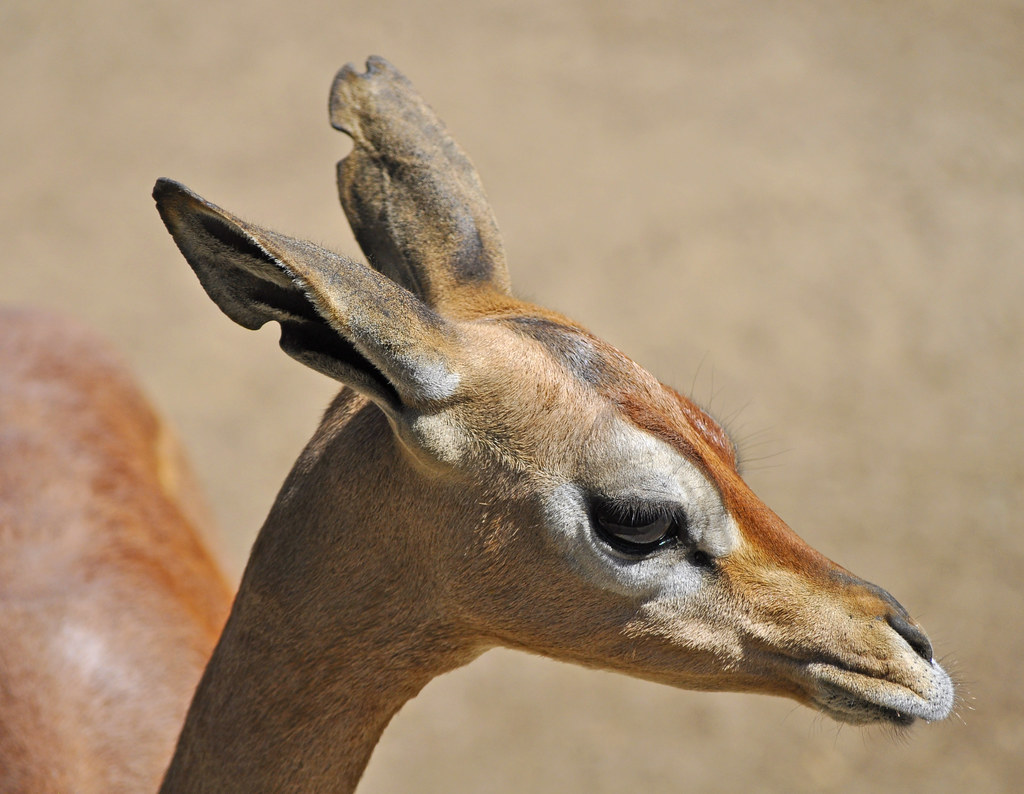
The Masai Mara National Park is renowned for its diverse wildlife, and one of the most fascinating creatures to be found here is the Gerenuk. These unique acrobats have long captivated visitors with their extraordinary abilities and distinctive appearance.
With their elongated necks, slender bodies, and slender, gazelle-like legs, Gerenuks are truly a sight to behold. They are known for their remarkable agility and flexibility, often seen standing on their hind legs while using their front limbs to reach for leaves and fruits on tall trees. It is this acrobatic behavior that has earned them the nickname “the giraffe gazelles” of the park.
In addition to their impressive acrobatics, Gerenuks have adapted to their surroundings in the Masai Mara National Park in other fascinating ways. Their head is uniquely shaped, featuring large, round eyes and small, pointed ears, enabling them to have enhanced vision and hearing. This allows them to be aware of predators and potential threats in their environment.
Gerenuks primarily feed on leaves, twigs, and fruits, which they pluck from trees with their dextrous front legs. Their diet, combined with their slender build, allows them to survive in arid conditions, making the Masai Mara National Park an ideal habitat. These incredible animals possess a camouflage coat of reddish-brown fur, helping them blend into their surroundings and evade potential predators.
If you are lucky enough to spot a Gerenuk during your visit to the Masai Mara National Park, take the time to observe their graceful acrobatics and their unique features. These captivating animals truly embody the essence of both beauty and agility in the wild.
Unveiling the Enigmatic Habits and Appearance of Gerenuk in Masai Mara National Park
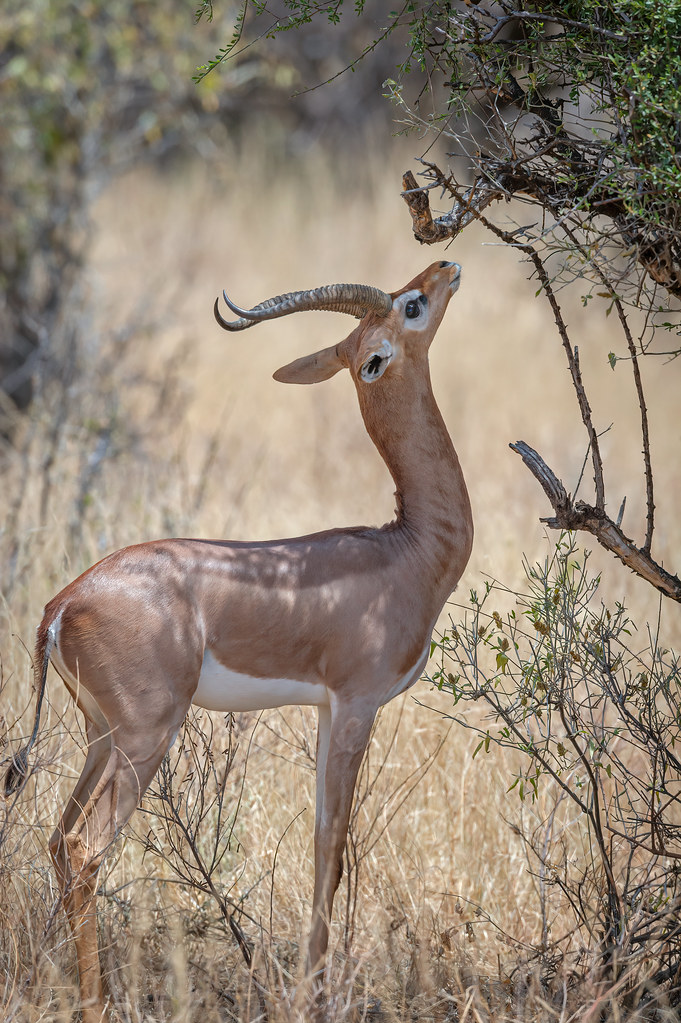
The vast plains of the Masai Mara National Park enfold countless wonders, but few can match the enigmatic charm of the gerenuk. These graceful antelopes, known as the “giraffe gazelles,” are endowed with a distinctive appearance and captivating habits that have made them a favorite among wildlife enthusiasts.
<p>Standing tall on their slender legs, gerenuks are endowed with a highly unique adaptation that enables them to reach for foliage beyond the reach of other herbivores. Their elongated necks and dainty hooves allow them to delicately browse on tender leaves and shoots found high up in the acacia trees. With this incredible ability, they can access food sources that are typically inaccessible to other animals, ensuring their survival even during moments of scarcity.</p>
<p>But the gerenuk's allure does not stop at their appearance. Unlike other wildlife species, these antelopes have developed a striking behavior that is both captivating and rare. Unlike their counterparts, gerenuks spend little time grazing on the ground. Instead, they prefer to stand on their hind legs and reach for higher branches. This peculiar habit not only provides them with a greater range of nourishment but also creates an enchanting spectacle as they effortlessly balance, showcasing their extraordinary elegance.</p>
<p>As you venture through the Masai Mara National Park, keep a keen eye out for the gerenuk. Their slender frame, elongated neck, and unique browsing methods make them an exceptional sight amidst the vast savannah. Witnessing these graceful creatures in action is an experience that will always hold a cherished place in your wildlife memories.</p>Insider Tips: Ideal Spots in Masai Mara National Park to Observe Gerenuk in Action
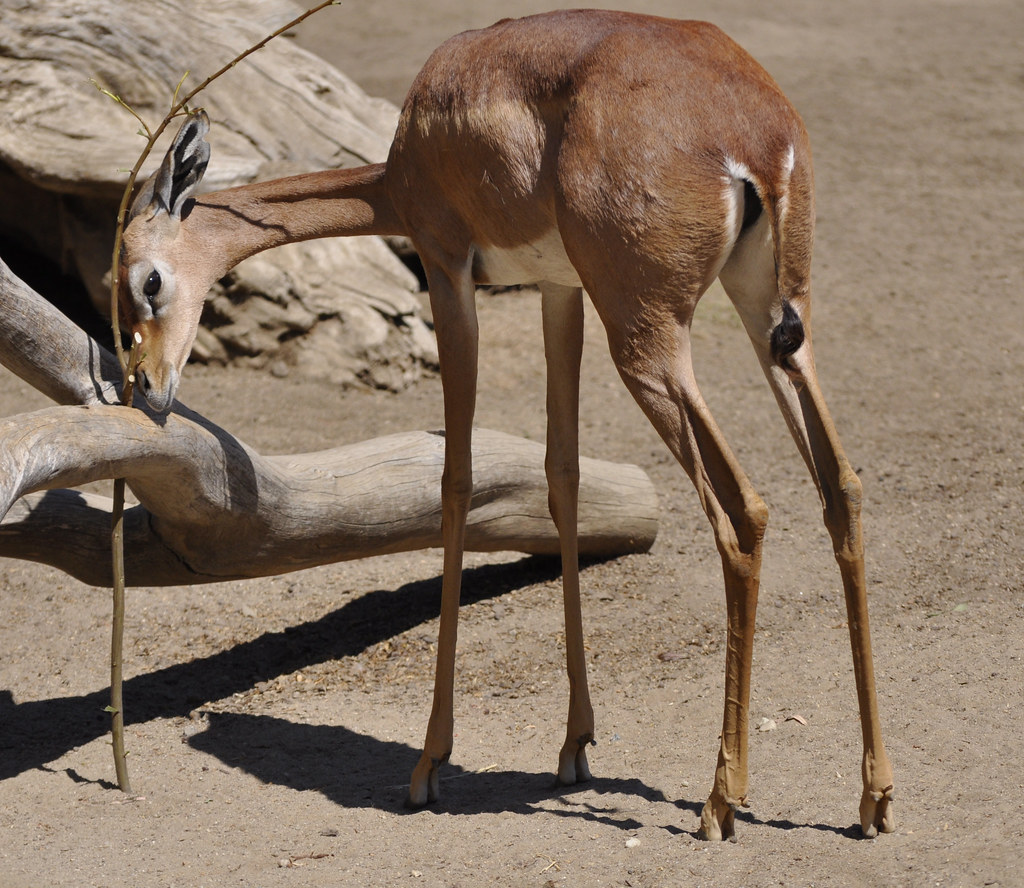
The majestic Masai Mara National Park in Kenya is renowned for its breathtaking landscapes and diverse wildlife. Among the fascinating creatures that roam this vast wilderness, one stands out in a truly unique way – the Gerenuk. This slender gazelle with its elongated neck and mesmerizing eyes is a sight to behold. If you’re looking for the ideal spots to observe these graceful animals in action, we’ve got you covered.
1. Acacia Woodlands: Gerenuks are often found grazing on the acacia trees that dot the rolling plains of Masai Mara. Keep an eye out for these striking creatures standing on their hind legs, gracefully stretching their long necks to reach the tender leaves high above. Watching them display their incredible balancing act amidst the sprawling woodlands is a truly captivating experience.
2. Riverbanks: Another perfect location to witness the Gerenuk in action is along the riverbanks of Masai Mara. Here, these gazelles can be seen delicately walking on their thin legs, browsing on the foliage close to the water’s edge. Their slender bodies and unique feeding habits make for an enchanting scene as they maneuver gracefully among the scenic backdrop of the Mara River.
Conservation Efforts: Preserving the Gerenuk Population in Masai Mara National Park
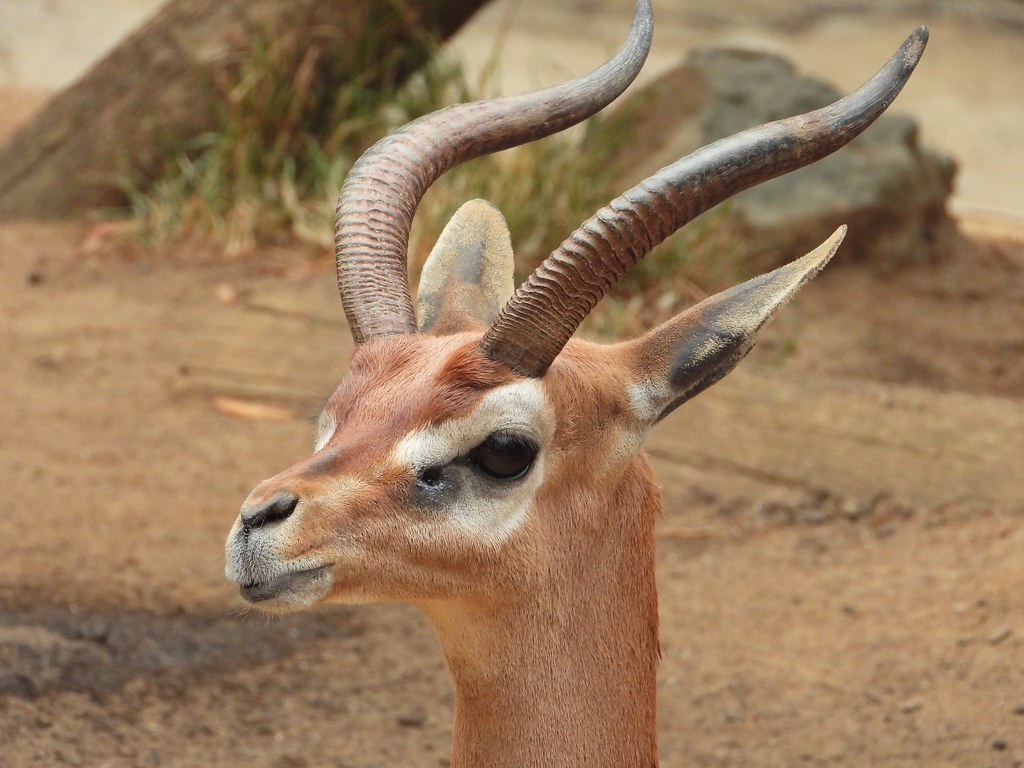
The Gerenuk, also known as the “giraffe gazelle,” is a unique and fascinating species that roams the vast savannas of Masai Mara National Park. With their elongated necks and slender bodies, these graceful antelopes have captured the hearts of wildlife enthusiasts from all around the world.
However, despite their captivating beauty, the Gerenuk population has faced numerous challenges in recent years. Habitat loss, caused by human encroachment and increased farming activities, has significantly impacted their numbers. Climate change has also played a role, resulting in droughts and a decrease in available food sources. To combat these issues, dedicated conservation efforts have been initiated within Masai Mara National Park.
The conservation initiatives aimed at preserving the Gerenuk population in Masai Mara National Park have proven to be highly successful. Here are some of the key efforts implemented:
- Protected Areas: Designating specific regions within the park as protected areas ensures that the habitat of the Gerenuk remains undisturbed by human activities. These areas serve as safe havens for their feeding, breeding, and rearing of young.
- Community Involvement: Engaging local communities living around the park has been crucial in the conservation efforts. Initiatives such as education programs, income-generating projects, and community-based patrols have increased awareness and reduced poaching incidents.
- Habitat Restoration: Restoration projects within the park have focused on reestablishing vegetation and water sources to support the Gerenuk’s specific feeding requirements. Reforestation and the creation of watering points have helped address the challenges posed by habitat loss and climate change.
These ongoing conservation efforts have not only stabilized the Gerenuk population but have also brought about positive changes in the overall ecosystem of Masai Mara National Park. Through continuous monitoring, research, and collaboration with local communities, Masai Mara National Park is ensuring the long-term survival of this remarkable species.
Discovering the Dietary and Survival Strategies of Gerenuk in Masai Mara National Park
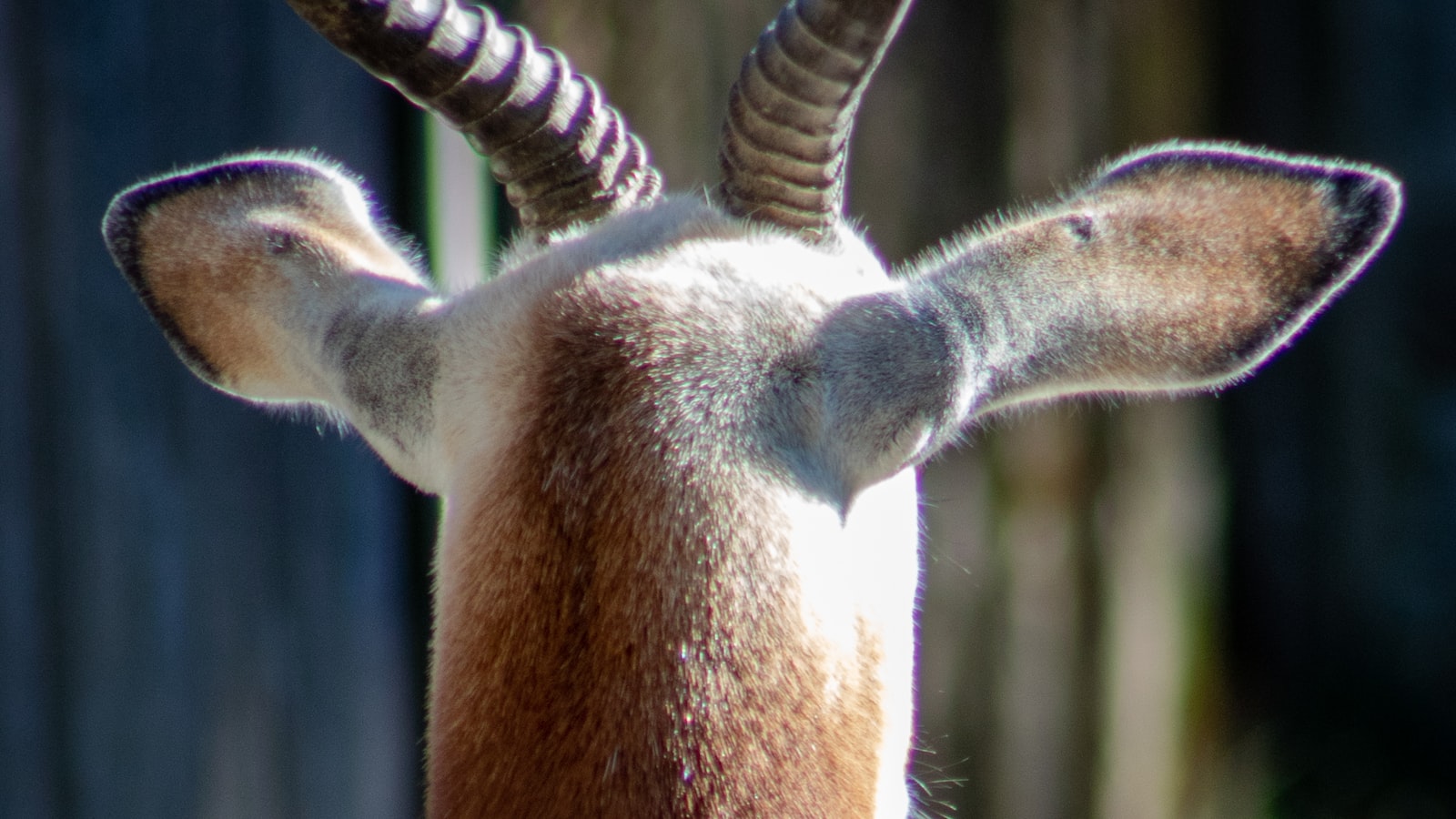
Gerenuk, also known as the “giraffe gazelle,” is a fascinating species that roams the iconic Masai Mara National Park. These unique creatures have developed remarkable dietary and survival strategies to thrive in this diverse and challenging environment.
One of the most intriguing aspects of the gerenuk’s diet is their preference for foliage, unlike other antelopes that primarily feed on grass. This selective feeding behavior allows them to utilize parts of vegetation that are inaccessible to other herbivores, enabling them to efficiently extract nutrients in arid conditions. As extraordinary browsers, gerenuks stretch their elongated necks and stand on their hind legs to reach higher branches and leaves. This striking adaptation not only provides a consistent food source but also gives them an advantage over competitors, as they can access resources that are overlooked by other grazing animals.
Q&A
Q: What magical creature is often spotted gracefully roaming the Masai Mara?
A: Answering the call of nature enthusiast, the mesmerizing Gerenuk takes center stage!
Q: What makes the Gerenuk so distinctive among other wildlife species?
A: Standing tall with its elongated neck and slender limbs, the Gerenuk is truly a majestic spectacle. Its name actually means “giraffe-necked” in the Somali language!
Q: Where can one spot these enchanting creatures?
A: The Masai Mara National Reserve in Kenya boasts of being one of the best places to catch sight of these elusive Gerenuks in their natural habitat.
Q: What type of terrain do Gerenuks prefer?
A: Gerenuks thrive in semi-arid landscapes dotted with acacia shrubs and scattered savannah grasslands. These resourceful creatures have adapted perfectly to this vast and diverse region.
Q: How do Gerenuks differ from other antelope species?
A: What sets the Gerenuk apart is its extraordinary ability to stand tall on its hind legs to reach for tree leaves and branches, defying gravity’s limitations! Their elongated necks provide them an unequaled competitive edge for foraging in this dry environment.
Q: What challenges do Gerenuks face in their daily life?
A: Despite their incredible adaptability, Gerenuks face the constant struggle of finding enough food and water to sustain themselves. Survival in this arid landscape demands great skill and resourcefulness.
Q: Are Gerenuks social creatures or do they prefer solitude?
A: Gerenuks embody independence, preferring a solitary lifestyle. However, they do occasionally gather together for brief social interactions or during mating season.
Q: What predators pose a threat to these elegant creatures?
A: Gerenuks must constantly remain vigilant, as they are targeted by lions, leopards, hyenas, and even wild dogs. Their exceptional agility and speed help them evade these fearsome predators successfully.
Q: How can tourists contribute to the conservation of Gerenuks?
A: Tourists can play a vital role in ensuring the protection of Gerenuks by supporting responsible eco-tourism practices, respecting their natural habitat, and promoting sustainable wildlife conservation efforts.
Q: Is there any ongoing research or conservation work being done to protect Gerenuks?
A: Yes, numerous organizations and researchers are dedicated to studying the behavior, habitat, and population of Gerenuks. Through these efforts, our understanding of these captivating creatures continues to grow, ensuring their well-being for generations to come.
Future Outlook
As we conclude our journey into the captivating world of the Gerenuk, we are left in awe of this extraordinary creature. Its slender and elegant body, coupled with its remarkably long neck and piercing eyes, have granted it a place among the most intriguing inhabitants of the East African savannas.
Through its exceptional adaptations, the Gerenuk has mastered the art of survival in harsh and unforgiving habitats. Its ability to stand on its hind legs and delicately stretch its elongated neck to reach leaves unreachable by others demonstrates its ingenuity and resourcefulness. Nature, as always, never ceases to amaze us.
The Gerenuk’s existence serves as a timeless reminder of the sheer diversity and wonders that our planet holds. It is but one thread woven into the rich tapestry of life, uniquely illustrating the intricate connections within ecosystems. As we marvel at this creature’s grace and agility, we acknowledge the importance of safeguarding its natural habitat, ensuring its survival for generations to come.
So let us leave the Gerenuk to continue its majestic dance across the vast landscapes it calls home, reminding us to celebrate the beauty and mysterious allure of the animal kingdom. As we venture forward, let us carry with us the ever-present curiosity and appreciation for the wonders that await our exploration – for the Gerenuk is but a single chapter in the infinite story of our shared natural heritage.




